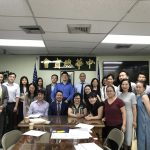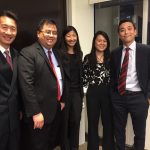Podcast: Live Your Dream featuring Michael Kim, co-founder Kobre & Kim
Podcast: Live Your Dream featuring Michael Kim, co-founder Kobre & Kim
Celina Lee’s podcast series provides a window into the unique journeys and experiences of individuals from a wide variety of professions. One of the interviewees for her podcast is Michael Kim, co-founder of Kobre & Kim LLP.
Michael Kim is the co-founder of the law firm, Kobre & Kim. Michael and his partner, Steven Kobre, met when they both worked as Assistant U.S. Attorneys in Manhattan while working on a securities case, which ultimately became the movie, the Boiler Room. They started their law firm at Steven’s apartment kitchen in 2003 and grew it into a global law firm with 10 offices worldwide and over 300 employees. Michael talks about why he decided to start the law firm even though 99% of the people he talked to said it was a terrible idea, and what he has learned about setting and achieving goals, building authentic relationships, and how to make yourself happy.
We congratulate AABANY member Michael Kim for being interviewed by Celina Lee on her podcast. We are also honored to count Kobre & Kim among AABANY’s sponsors.
LEAD – a Professional development program for young women immigrants – INFORMATION SESSION
LEAD – a Professional development program for young women immigrants – INFORMATION SESSION
8 free workshops
Learn about the job search process, resume writing, US workplace culture, job interviews, networking, public speaking, teamwork, and much more! For more details, click on the link above.
For additional questions, please contact
Vilma Álvarez-Steenwerth,
Senior Librarian, at The New York Public Library at
NAPIPA & C.C. Yin Scholarships for Justice
The National Asian Pacific Islander Prosecutors Association (NAPIPA) is proud to announce
that the NAPIPA & C.C. Yin Scholarships for Justice will be awarded once again this year. The
Scholarship is named in honor of distinguished Asian / Pacific Islander (API) community leader
and entrepreneur C.C. Yin. It is intended to encourage law students who share NAPIPA’s
mission and goals into pursuing careers in prosecution and continuing to help the API
community.
This year, NAPIPA will award a Kaplan Bar Review course and a cash scholarship ranging from
$500 to $1000 to each of three (3) law students.
In order to be eligible for these scholarships, the applicant must:
1) Be an enrolled law student as of September 1, 2017 and for the 2018 school year;
2) Be a member of NAPIPA (applications may be submitted contemporaneously with
scholarship applications and can be found online at www.napipa.org);
3) Be personally present at the Scholarship Banquet on September 21, 2018, at the Golden
Unicorn in New York, N.Y.
4) If necessary, be available to be interviewed through video conferencing such as
FaceTime or Skype.
5) Please note, students who are already enrolled in the Kaplan Bar Review course are not
eligible for the Kaplan course scholarship
A scholarship application is available at
https://docs.google.com/forms/d/e/1FAIpQLScTMxGkQFalfrLxfhem6FYZ2m61aZi5rAan13_4yXh6kJd95g/viewform
All application materials must be completed and received by 6:00 p.m. EST on
August 31, 2018.
Please contact Albert Suh at ([email protected]) if you have any questions.
















